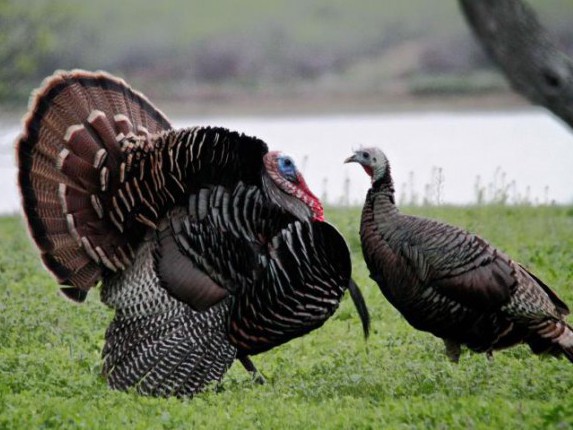Tuilleadh Cainte ar Thurcaithe (Some Irish Vocabulary for ‘Talking Turkey’) Posted by róislín on Nov 20, 2015 in Irish Language
(le Róislín)

Turcaí fireann agus turcaí baineann, http://www.public-domain-ge.com/free-images/fauna-animals/birds/turkey-birds-pictures/pair-of-wild-turkey-birds-male-and-female-in-breeding-plumage-meleagris-gallopavo, by Burton Robert, U.S. Fish and Wildlife Service
In a recent blog post, I referred to a short article on turkeys written in the Irish-language online newsletter, Líon an Dúlra (Eagrán 6, Geimhreadh 2013). Here, I thought we could look at a bit more “turkey” vocabulary, based on the article, and do a short Q & A. I’ll also add some pronunciation notes.
Here’s the link, and you’ll probably want to read that first, or at least have the text open on another screen, for “sruthléamh.” The article also has its own glossary (leathanach 17, i.e. a seacht déag , den nuachtlitir): http://www.gaeilge.ie/wp-content/uploads/2014/12/L%C3%ADon_an_D%C3%BAlra-Geimhreadh_2013.pdf
ar mhaithe le [erzh WAH-huh leh, silent m and t], for the sake of
díothaithe [DJEE-uh-huh-huh, both t’s silent], extinct
seilg [SHEL-ig] hunt, hunting
ag an tseilg [egg un TCHEL-ig], here “by the hunt/hunting” (i.e. because of the hunt/hunting). Why the “t” before the “s”? It’s a systematic rule in Irish–after the word for “the,” prefix a “t” before nouns beginning with “s” followed by a vowel if they are singular in number and feminine in grammatical gender. Additional examples include: súil, an tsúil [un TOO-il] (eye, the eye) and seacláid, an tseacláid [un TCHAK-lawdj] (chocolate, the chocolate).
That may seem like a very specific rule, and it is, but applies widely in Irish. Some people like to add, “… and if it’s Tuesday and it’s raining,” but, as you must have realized there, níl siad ach ag magadh. Of course, cainteoirí líofa know there are many more dimensions to this t-prefixing rule, like what to do about “scoil” vs. what to do with “snáthaid,” not to mention the newer borrowings in the language, like “svaeid,” but those will have to wait for blagmhír éigin eile.
taiscealaithe ón Eoraip, “European explorers,” as the article in Líon an Dúlra glosses it; literally, “explorers from Europe”. Notice that “from Europe” is really “from (the) Europe” (ó + an + Eoraip, with “ó + an” becoming “ón“). The word “Europe” takes the definite article “an” (the) in front of it, as do most country names in Irish (An Fhrainc, An Spáinn, srl.). In English, this generally happens only if a country or area name has a built-in adjective (The Netherlands) or if it’s is plural (The Bahamas, The Philippines, The United States, etc.) or if both situations apply (The Canary Islands, The Lesser Antilles). But in Irish, in contrast, most country names do include the word “the,” although there are some notable exceptions (Peiriú, Cúba, Lucsamburg, Madagascar, srl.)
turcaí tí, domestic turkey, lit. “house” turkey or “turkey of house,” with “turcaithe tí” as the plural
turcaí fiáin, wild turkey, basically an exact match to the English, since “fiáin” means wild. There is a slight change for the plural though: turcaithe fiáine [FEE-awn-yuh], adding the final “-e” to make “fiáin” plural.
Now for “Tráth na gCeist” (or as some might have it, Tráth na gCeisteanna); freagraí thíos
- Cén Ghaeilge atá ar na hornáidí feolmhara atá ar mhuiníl agus ar scornacha turcaithe?
- Cá as an Turcaí Fiáin?
- An as an Tuirc é an Turcaí Tí?
- Cén áit ar thosaigh daoine ag coimeád turcaithe tí ar dtús?
- Cén t-ainm atá ar na turcaithe óga?
Bhuel, for those celebrating Thanksgiving (daoine sna Stáit Aontaithe nó Meiriceánaigh thar sáile) or for those anticipating a dinnéar turcaí on Lá Nollag, or just generally consuming turkey am ar bith sa bhliain, go raibh do thurcaí blasta agus go raibh solamar ann. Agus go n-ithe tú an fuílleach éigríochta sula n-éiríonn sé lofa. SGF – Róislín
Freagraí:
- carancailí (caruncles)
- Is as Meiriceá Thuaidh [HOO-ee] é. (It’s from North America).
- Ní hea, ní as an Tuirc é an Turcaí Tí. (No)
- i Meicsiceo [ih MEK-shik-yoh] (in Mexico)
- éan turcaí (a turkey chick), éin turcaí (turkey chicks) OR, if the context is clear, éanán, pl: éanáin. Éanán could also refer to other young birds, and éan can be used with other bird names as well (éan circe [KIRK-yuh], a chick, lit. bird of hen; éan gé, gosling)

Build vocabulary, practice pronunciation, and more with Transparent Language Online. Available anytime, anywhere, on any device.




Leave a comment: